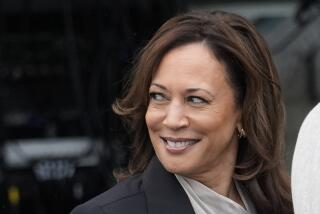Jon Huntsman’s strategy just wasn’t made for these times
Jon Huntsman’s final chore as a presidential candidate will be to leave the 2012 race Monday with his reputation intact or, ideally, enhanced.
For presidential contenders, the best days of their campaigns are often the first and last ones. But not everyone is up to the challenge. How many people remember what Rep. Michele Bachmann said in her concession speech after losing Iowa, less than two weeks ago?
Huntsman’s late-starting candidacy began inauspiciously, following his return from China last spring. Reporters attending the announcement event had their Huntsman press tags unceremoniously taken away before Huntsman and his attractive family arrived at the site. Embarrassingly, the candidate’s first name was misspelled as “John” on the tags. No one in his entourage had noticed until it was too late.
Offering himself as a different kind of politician, the former Utah governor appealed in his announcement speech for a more civil brand of politics. “I don’t think you need to run down anyone’s reputation to run for president,” said Huntsman. Within months, he would abandon that high-minded notion as he became increasingly desperate to tear down Mitt Romney, the man he’s endorsing today.
The announcement venue, like much of Huntsman’s campaign, had a borrowed feel: the same park, with the Statue of Liberty as a backdrop, that Ronald Reagan used for a campaign launch. Huntsman’s chief strategist was a former top aide to John McCain who intended to re-create the 2008 Granite State miracle that boosted the Arizonan to the Republican nomination.
Huntsman bought into the idea of copying the McCain 2008 playbook, skipping the Iowa caucuses in favor of an emphasis on New Hampshire and other early states, with a pitch tailored to more moderate Republican conservatives and independents.
It’s easy, in hindsight, to criticize strategic moves, but the decision was a major strategic blunder. Iowa is where obscure candidates such as Huntsman go to become known. It didn’t help that he failed to gain altitude in New Hampshire, despite putting in more campaign days than the other contenders.
At the same time, it’s a credit to the Huntsman team that he was taken as seriously as he was. Editors across America bought in to the irresistible narrative of a moderate Republican and fellow Mormon taking on a long-time family rival from the left. Less admirably, the news media continued to pursue that storyline long after it was clear that Huntsman was going nowhere.
Fatally flawed from the start by, among other things, a too-close connection to the hated Barack Obama (a man he praised as a “remarkable leader” after accepting his offer of the top U.S. diplomatic post in Beijing), Huntsman wound up a poor third in last Tuesday’s primary. His gamble hadn’t paid off and he was left with nowhere else to go, as he eventually figured out, except home — a grand new residence in Washington, D.C.
If Romney wins, Huntsman could be in line for an appointment — an early, and intriguing, test of the new president’s ability to forgive an old foe. If that doesn’t happen, or if Obama is re-elected, Huntsman can still look forward to what many politicians always regarded as the real purpose of this first presidential try — another run in 2016.
To that end, what Huntsman says as he exits the race will help shape the way a future campaign is perceived.
More to Read
Sign up for Essential California
The most important California stories and recommendations in your inbox every morning.
You may occasionally receive promotional content from the Los Angeles Times.









